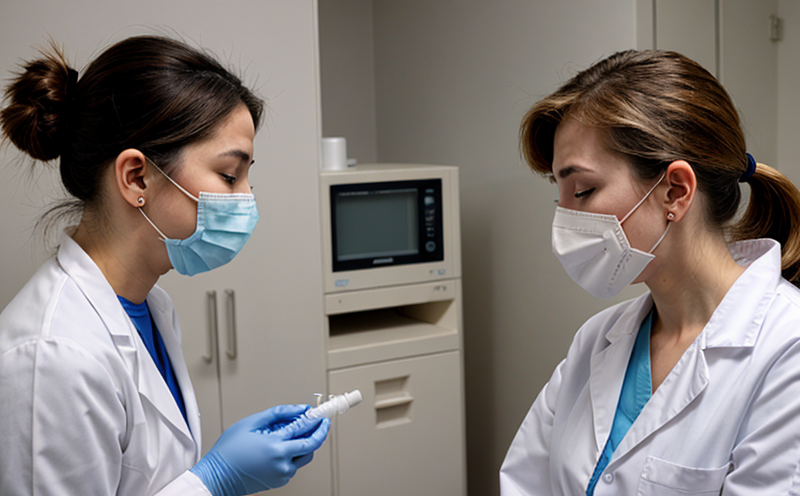Multiplex PCR Testing for Food Allergen Genes
Food allergies are a significant public health concern, affecting millions of individuals worldwide. The complexity and variety of food allergens require robust, reliable testing methods to ensure product safety and compliance with regulatory standards. Multiplex Polymerase Chain Reaction (PCR) technology offers a powerful solution by enabling simultaneous detection of multiple food allergen genes in a single assay.
Our Multiplex PCR Testing service is designed specifically for the clinical and healthcare sectors, targeting quality managers, compliance officers, R&D engineers, and procurement professionals. This advanced testing methodology allows for efficient identification of potential allergens, ensuring that products meet stringent safety standards and consumer expectations.
The process begins with careful selection of target genes associated with common food allergens such as peanuts, tree nuts, soy, milk, fish, crustaceans, eggs, and wheat. These genes are amplified using multiplex PCR technology, which increases the efficiency and accuracy of detection by reducing the number of samples required for analysis.
Our laboratory utilizes state-of-the-art instrumentation to ensure precise and reproducible results. Specimen preparation involves extraction of DNA from food samples followed by rigorous quality control checks to maintain consistency across all tests. The use of multiple gene targets ensures comprehensive coverage, minimizing false negatives while maintaining high specificity.
The resulting data is analyzed using sophisticated software that integrates information from various gene amplification reactions into a single report. This approach provides clients with clear insights into the presence or absence of allergens in their products, facilitating informed decision-making regarding product formulation and labeling practices.
By leveraging this advanced technology, our laboratory helps clients stay ahead of regulatory requirements and industry trends, fostering trust among consumers who rely on accurate and reliable information when making purchasing decisions related to food safety.
| Allergen Type | Target Gene(s) | Common Foods Containing Allergens |
|---|---|---|
| Peanut | PEA1 | Frozen foods, baked goods, candies |
| Tre Nuts (Almond) | ALD2 | Beverages, cereals, snack bars |
| Soybean | SPN1 | Milks, cheeses, tofu products |
| Dairy (Milk) | CASE1 | Baby formula, yogurt, ice cream |
| Fish | FIN1 | Fried foods, sauces, marinades |
| Crustaceans (Shrimp) | CRT1 | Soups, dips, sushi dishes |
| Eggs | EGG1 | Baked goods, sauces, dressings |
| Wheat | TRV1 | Pasta, breads, pastries |
Why It Matters
Food allergies can have severe and sometimes life-threatening consequences. Ensuring the absence of allergens in food products is crucial for protecting vulnerable populations from accidental exposure. Our Multiplex PCR Testing service plays a vital role in safeguarding public health by providing accurate, timely results that help manufacturers comply with regulatory requirements.
Consumer trust is paramount in today's market. By adopting this advanced testing methodology, companies can demonstrate their commitment to safety and quality, thereby enhancing brand reputation and fostering long-term customer loyalty. Additionally, compliance with international standards like ISO 17025 ensures that our laboratory meets the highest industry benchmarks.
The ability to detect multiple allergens simultaneously not only streamlines production processes but also reduces costs associated with repeated testing of individual components. This efficiency contributes to more sustainable operations and better resource management within organizations.
Our service supports a wide range of stakeholders, including healthcare providers who need accurate information for patient care, regulatory bodies responsible for enforcing food safety laws, and consumers seeking assurance about the products they consume daily.
Scope and Methodology
The scope of our Multiplex PCR Testing service encompasses a comprehensive approach to identifying potential allergens in food products. We employ a multi-step process that begins with sample collection, followed by DNA extraction and amplification using multiplex PCR technology.
For each target gene identified as relevant for specific allergens, we design primers tailored to the sequence of interest within the gene. These primers ensure specificity during amplification, reducing the risk of cross-reactivity with other sequences present in the sample matrix.
The amplification products are then subjected to gel electrophoresis or alternative separation techniques to visualize distinct fragments corresponding to different allergens. Post-visualization analysis involves image processing software to quantify band intensities and compare them against established calibration standards.
Our laboratory adheres strictly to international standards such as ISO 17025, ensuring that all procedures are conducted under controlled conditions that guarantee reproducibility and accuracy. Compliance with these standards is essential for maintaining credibility within the industry and meeting regulatory expectations.





